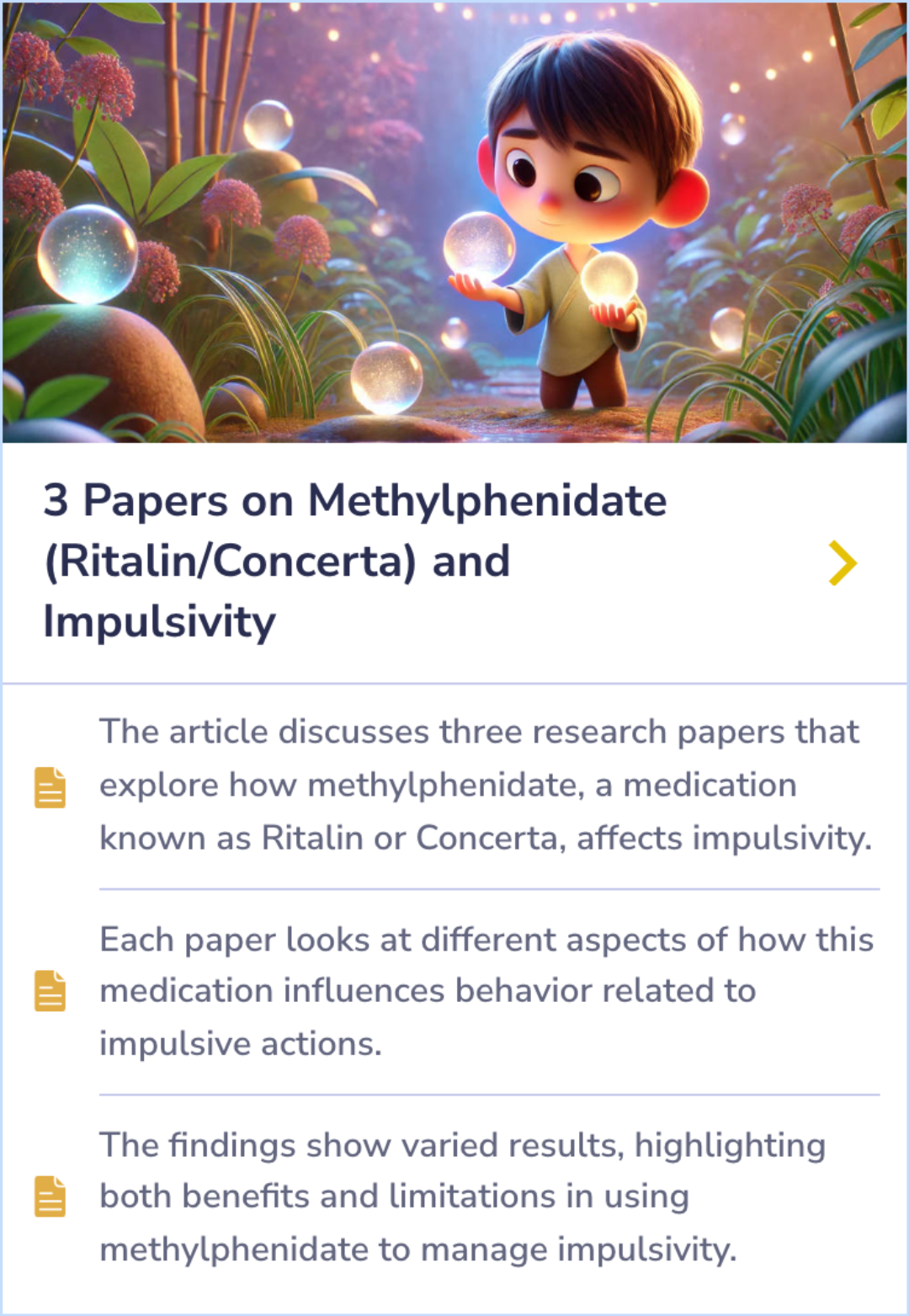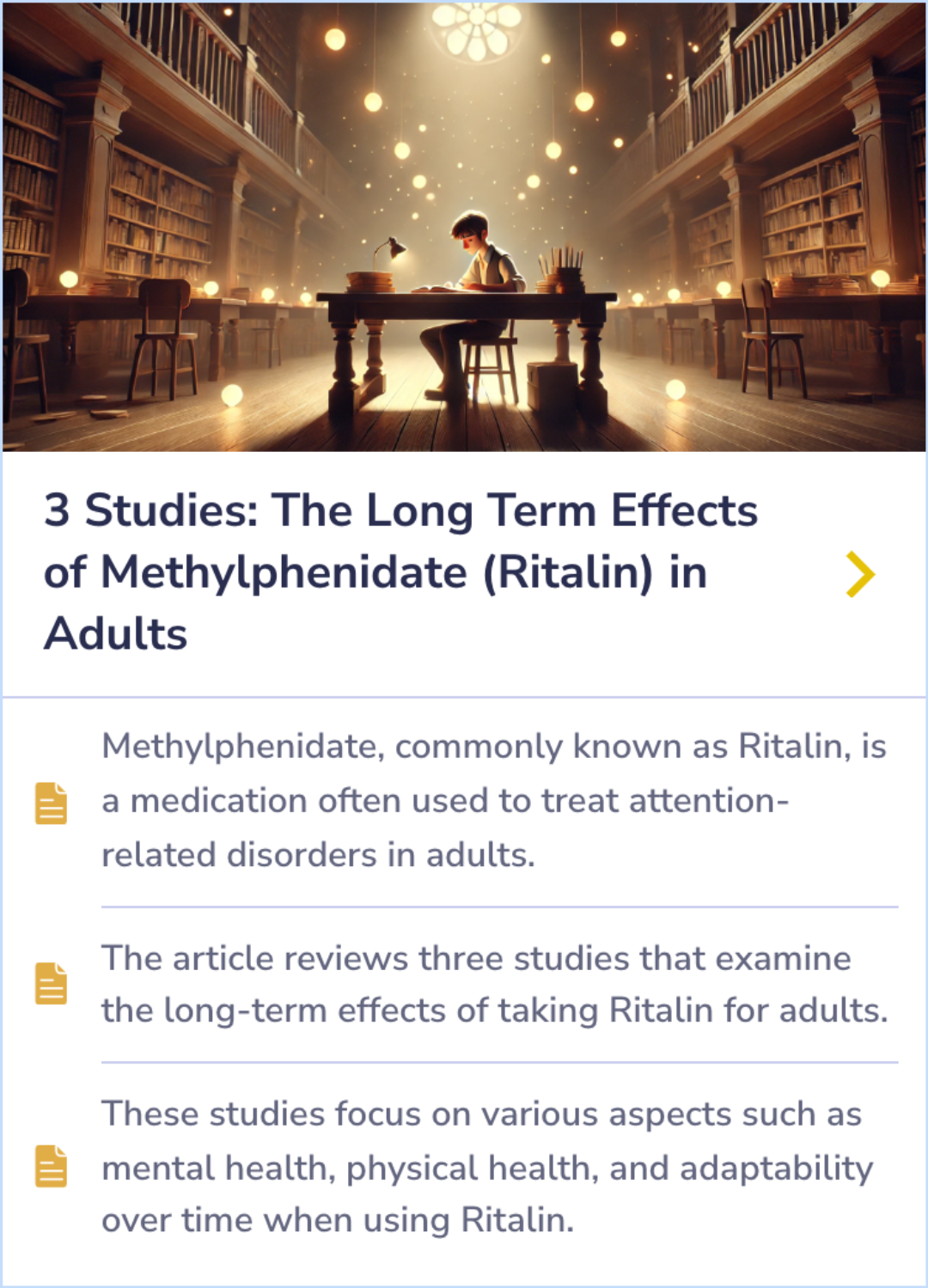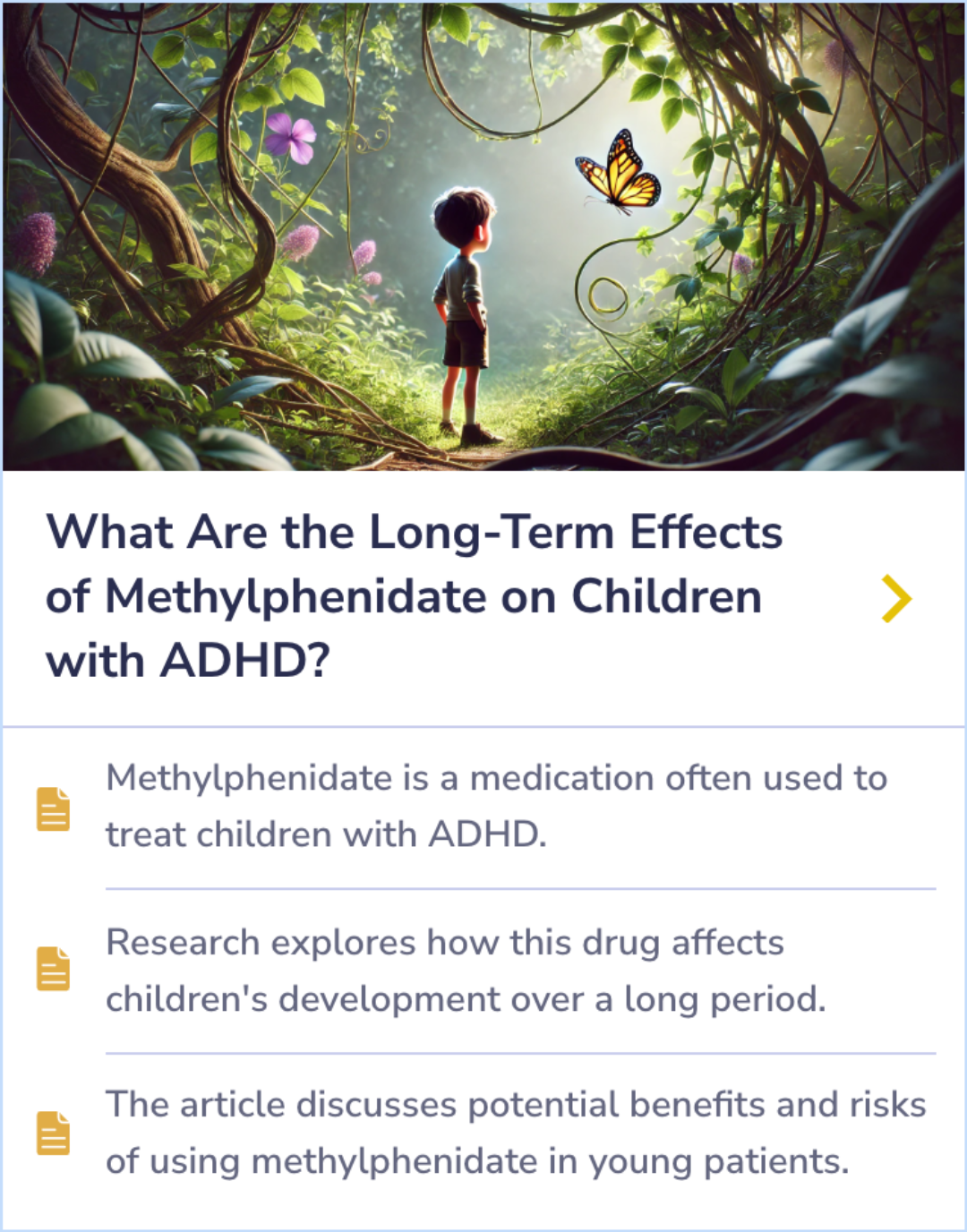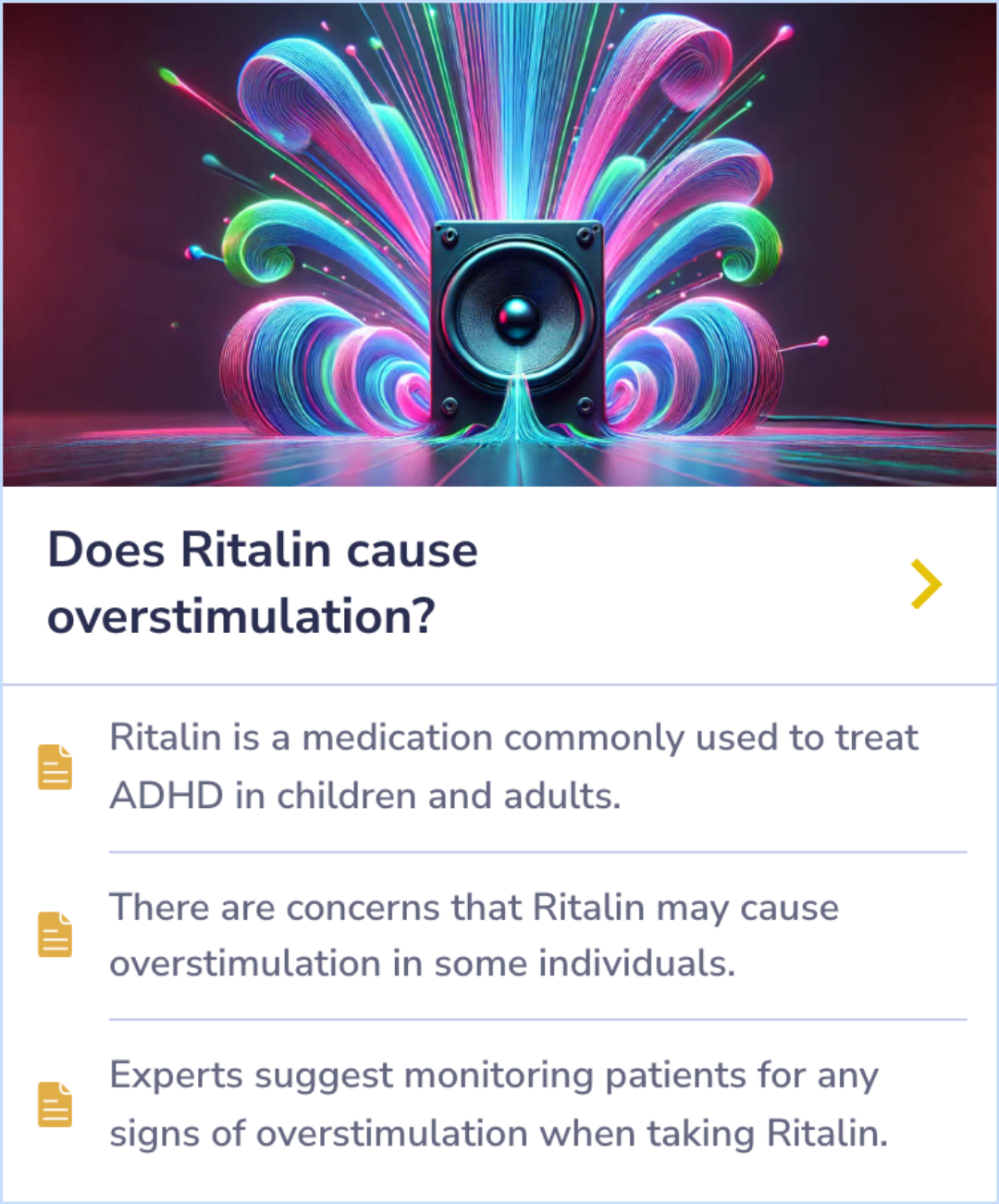Ritalin
Evidence Based Answers
Can Ritalin cause personality changes?
Ritalin can impact mood and behavior, with some users experiencing shifts like anxiety or restlessness, while rare cases may develop psychotic symptoms. Compulsive behaviors and emotional fluctuations may also occur, requiring careful monitoring.
Published: November 7, 2024
Click to explore a section:
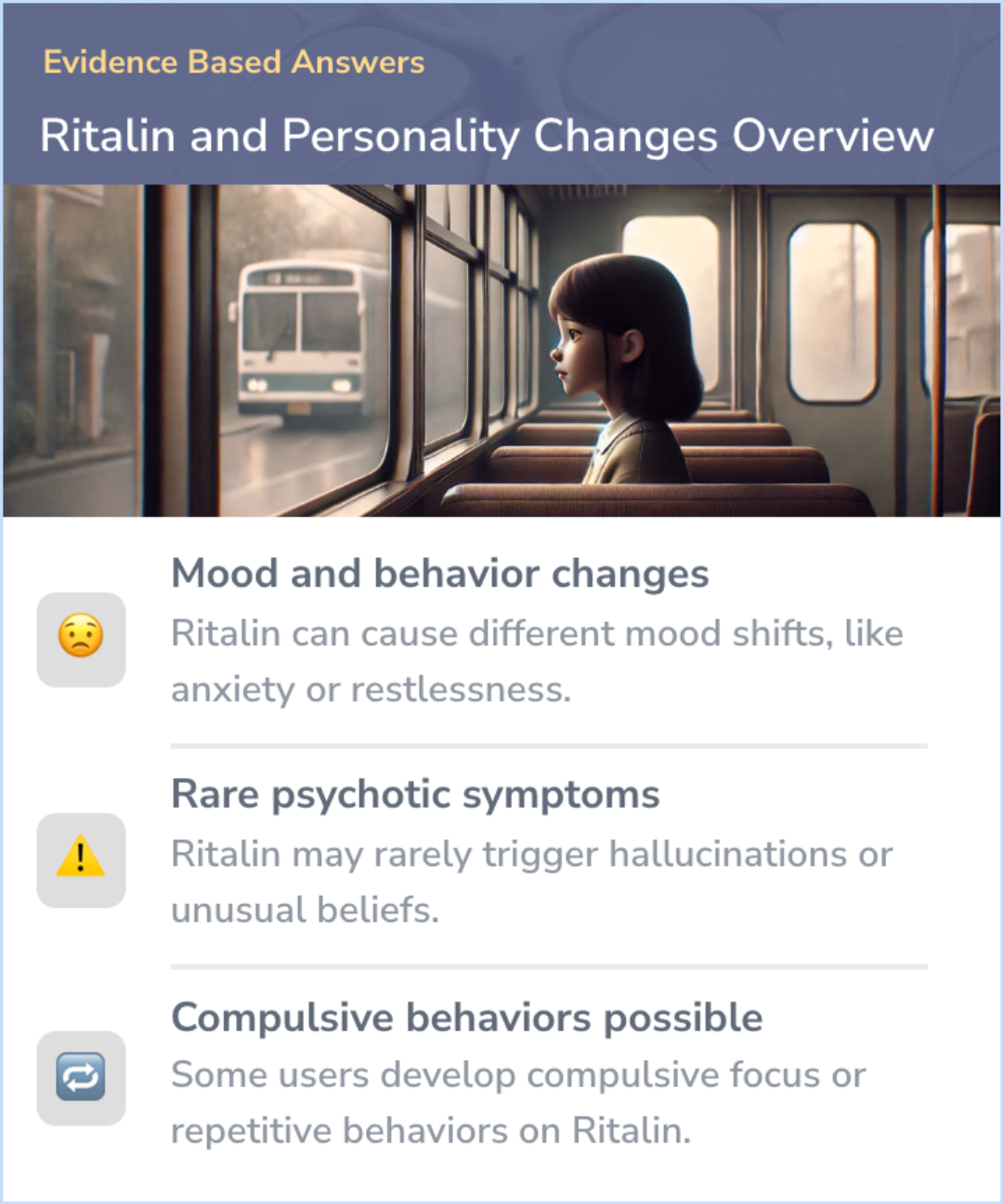
Ritalin may alter mood, trigger rare psychotic symptoms, or lead to compulsive behaviors.
Background: Watch for Personality Changes
Ritalin has been associated with new or worsening behavior and thought problems, such as psychosis and mania. It can lead to aggressive behavior, hostility, and other psychiatric symptoms even in individuals without previous issues.
Parents are advised to monitor children on Ritalin for signs of hearing voices, believing untrue things, and displaying suspicious behavior. It's important to inform doctors if any such symptoms emerge, as these could indicate significant personality changes.
Parents are advised to monitor children on Ritalin for signs of hearing voices, believing untrue things, and displaying suspicious behavior. It's important to inform doctors if any such symptoms emerge, as these could indicate significant personality changes.
Personal Experiences
Perspectives: Ritalin and Your True Self
In discussions about Ritalin and personality changes, individuals share a range of experiences. Some find medication improves their social interactions, providing focus without dampening their true self. For others, medication brings balance but at the cost of emotional vibrance.
Some report feeling subdued, while others experience pronounced benefits or adverse effects that limit use. The diverse responses highlight personalized reactions to ADHD medication.
Some report feeling subdued, while others experience pronounced benefits or adverse effects that limit use. The diverse responses highlight personalized reactions to ADHD medication.
Reddit: u/Medalost
I think I generally get a bit less "quirky" on medication, but I think it's possible and even likely that the quirkiness is some kind of coping mechanism...Mood and Behavioral Changes with Ritalin
Ritalin, a common medication for ADHD, can affect mood and behavior. While some people may become more active or feel a positive mood shift, others might experience anxiety, restlessness, or mood swings. Reactions to Ritalin can differ significantly between individuals.
Some people become more talkative, while others may feel irritable or have emotional fluctuations. Observing and discussing these changes with healthcare professionals is recommended to ensure appropriate treatment adjustments.
Some people become more talkative, while others may feel irritable or have emotional fluctuations. Observing and discussing these changes with healthcare professionals is recommended to ensure appropriate treatment adjustments.
“
Source Quotes:
Methylphenidate tends to increase activity, arousal, talkativeness and mood in normal subjects.
Patients are more prone to become easily agitated, irritable, or depressed and go through mood swings/lability.
Potential for Psychotic Symptoms on Ritalin
In rare situations, Ritalin use can lead to psychotic or manic symptoms, such as seeing or hearing things that aren't there or having unusual beliefs. This can occur even at regular doses and tends to affect children and adolescents without prior mental health issues.
These symptoms may appear suddenly and may require changes to the treatment plan to prioritize safety.
These symptoms may appear suddenly and may require changes to the treatment plan to prioritize safety.
“
Source Quotes:
Emergence of New Psychotic or Manic Symptoms Treatment emergent psychotic or manic symptoms, e.g., hallucinations, delusional thinking, or mania in children and adolescents without a prior history of psychotic illness or mania can be caused by stimulants at usual doses.
Frank psychotic episodes can occur, especially with parenteral abuse.
Compulsive and Perseverative Behaviors on Ritalin
Some people using Ritalin may display behaviors like excessive focus on specific tasks or compulsive actions. These behaviors might not depend on the dosage and can continue throughout treatment.
Careful observation helps in adjusting treatment to minimize any negative effects of such behaviors.
Careful observation helps in adjusting treatment to minimize any negative effects of such behaviors.
“
Source Quotes:
Compulsive behaviours were observed in 23 subjects. Behaviour on methylphenidate was primarily perseverative and detail oriented.
The onset of the behaviours was not dose-related, nor were the behaviours transient as they usually were exhibited throughout the treatment week for a specific dose but could alter or disappear on a different dose.
Emotional Variability with Ritalin
Emotional shifts, such as irritability, feeling tense, or experiencing low mood, can happen with Ritalin treatment. These changes are more common during the early stages of treatment.
Regular follow-ups can help identify and manage these emotional effects to improve overall treatment outcomes.
Regular follow-ups can help identify and manage these emotional effects to improve overall treatment outcomes.
“
Source Quotes:
Clinicians should screen for symptoms of depression, agitation, aggressiveness, new-onset or pre-existing psychosis or mania, and suicidality as these can be worsened when initially starting methylphenidate.
Patients are more prone to become easily agitated, irritable, or depressed and go through mood swings/lability.
Key Takeaways
Conclusions
Ritalin, often used to manage ADHD symptoms, can lead to varied personality and mood effects. Some users may experience mood lifts, increased activity, or enhanced social interactions, while others might encounter anxiety, irritability, or restlessness. Observing these responses is important, as reactions differ widely.
Rarely, Ritalin has been linked to psychotic symptoms, such as hallucinations or unusual beliefs, typically in young users. Additionally, compulsive or excessively focused behaviors can emerge, highlighting the importance of monitoring to ensure balanced, effective treatment.
Rarely, Ritalin has been linked to psychotic symptoms, such as hallucinations or unusual beliefs, typically in young users. Additionally, compulsive or excessively focused behaviors can emerge, highlighting the importance of monitoring to ensure balanced, effective treatment.

Evidence Summary
How Methylphenidate Influences Impulsivity
Three studies explore methylphenidate’s effects on impulsivity, focusing on behavior and decision-making. Each study examines different ways this medication, known as Ritalin or Concerta, might influence impulsive actions.
Results vary across the studies, showing both potential benefits and some limitations in using methylphenidate to manage impulsive behavior, reflecting a complex picture of its impact on impulsivity.
Results vary across the studies, showing both potential benefits and some limitations in using methylphenidate to manage impulsive behavior, reflecting a complex picture of its impact on impulsivity.
Evidence Summary
Exploring the Long-Term Impact of Ritalin on Health
Long-term use of Ritalin brings various effects on adults, addressing both mental and physical health. Studies focus on how individuals adapt to this medication over time, highlighting changes that can occur as they continue treatment.
Methylphenidate, widely known as Ritalin, plays a significant role in managing attention disorders, and understanding its long-term impact helps clarify its overall effectiveness. Each study sheds light on how adults experience these health aspects while using Ritalin, providing valuable insights into its use.
Methylphenidate, widely known as Ritalin, plays a significant role in managing attention disorders, and understanding its long-term impact helps clarify its overall effectiveness. Each study sheds light on how adults experience these health aspects while using Ritalin, providing valuable insights into its use.
Evidence Summary
Methylphenidate's Long-Term Impact on Children with ADHD
The article dives into how methylphenidate, a widely used ADHD medication for children, may impact long-term development. Researchers examine both potential benefits, like improved focus and behavior, and possible risks associated with prolonged use.
The discussion covers how this medication works over time and raises questions about how it could influence a young patient's growth and overall well-being.
Parents and caregivers might find this exploration of benefits and risks informative when considering treatment options.
The discussion covers how this medication works over time and raises questions about how it could influence a young patient's growth and overall well-being.
Parents and caregivers might find this exploration of benefits and risks informative when considering treatment options.
Evidence Summary
Monitoring Ritalin for Overstimulation Risks
Ritalin is widely prescribed to treat ADHD in both children and adults. However, some individuals may experience overstimulation, which can manifest in various ways. Monitoring patients closely is recommended to identify signs of overstimulation early.
Experts emphasize that careful oversight of Ritalin treatment can help manage any potential overstimulation effects, ensuring that therapy remains effective and safe.
Experts emphasize that careful oversight of Ritalin treatment can help manage any potential overstimulation effects, ensuring that therapy remains effective and safe.
